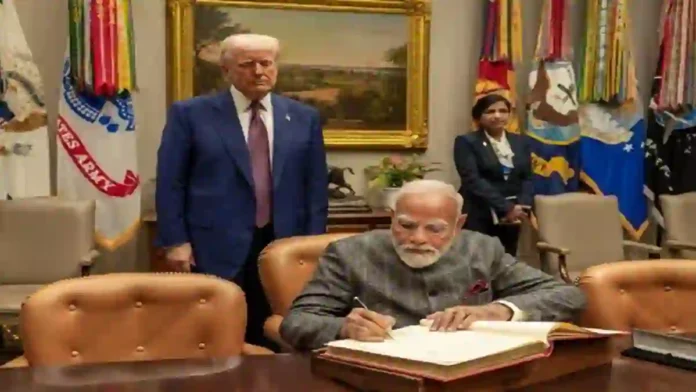United States President Donald Trump has reaffirmed the strength of the India-US partnership while clarifying recent remarks about New Delhi’s ties with Moscow and Beijing. Speaking in Washington, Trump reiterated his personal friendship with Prime Minister Narendra Modi, describing India-US relations as a “very special relationship” and stressing that “there is nothing to worry about.”
He underlined that despite occasional disagreements, such as his disapproval of what Modi is “doing at this particular moment,” the broader bilateral relationship remains intact. Trump added that he would “always be friends” with Modi, signalling continuity in the personal rapport that has been a hallmark of the two leaders’ diplomacy in past years.
Read- A Silent But Transformative Indigenous Drone Revolution Is Underway In India
When asked about ongoing trade talks with India and other countries, Trump highlighted “great progress,” though he also coupled his remarks with criticism of the European Union.
The President expressed outrage at the European Commission’s recent decision to impose a USD 3.5 billion fine on Google for anti-competitive practices in Adtech, accusing Brussels of unfairly targeting US technology companies.
He called the EU’s move “discriminatory action,” vowing that his administration would not allow such measures to harm American corporations. This underscores Trump’s wider pattern of defending US economic interests aggressively, particularly in the sphere of international technology markets.
On India’s energy imports from Russia, however, Trump flagged concerns. Acknowledging disappointment with New Delhi’s purchase of discounted Russian oil, he disclosed that the US has imposed a 50 percent tariff on India, calling it “very high.”
At the same time, he tempered this criticism by pointing out that he continues to maintain good relations with Modi, even mentioning a recent joint appearance at the White House Rose Garden.
His remarks served to balance a message of strategic disapproval with reassurance on personal and institutional ties. Notably, these comments came just days after a controversial Truth Social post, where Trump suggested that the US had “lost Russia and India to deepest, darkest China.”
Read- ‘India & China Are Economic Giants’: Putin’s Strong Message To Trump
Addressing this point before reporters, the President softened his tone, insisting, “I don’t think we have,” and implying that India’s alignment is still contested and not permanently lost to Beijing’s orbit.
In parallel, the Government of India, through the Ministry of External Affairs (MEA), emphasised continuity, stability, and future-oriented engagement in its response. MEA spokesperson Randhir Jaiswal stressed that India-US relations are anchored in a “comprehensive global strategic partnership” underpinned by democratic values, shared interests, and strong people-to-people exchanges.
He noted that the partnership has survived “several transitions and challenges,” and stated that India remains committed to advancing the substantive bilateral agenda with Washington on the basis of “mutual respect and shared interests.” Specifically addressing trade concerns, Jaiswal confirmed that India continues its engagement with the United States to resolve issues and sustain economic cooperation.
The developments highlight the multi-dimensional and sometimes complex character of India-US ties. On one hand, Trump’s rhetoric oscillates between personal warmth towards Modi and dissatisfaction over policy choices related to energy and trade. On the other, India has signalled steady institutional commitment to the partnership irrespective of political cycles in Washington.
Against the backdrop of shifting geopolitical alignments involving Russia and China, these statements underline both the resilience of bilateral ties and the fragility of perceptions that shape them.
While tariffs, trade disputes, and energy policy remain friction points, the larger framework of strategic cooperation persists—anchored by shared security goals, economic complementarities, and enduring diplomatic engagement.
Would you like me to also create a timeline table mapping Trump’s statements, tariffs, EU fines, and MEA responses for clearer sequencing of events?
Based On ANI Report
Agency




